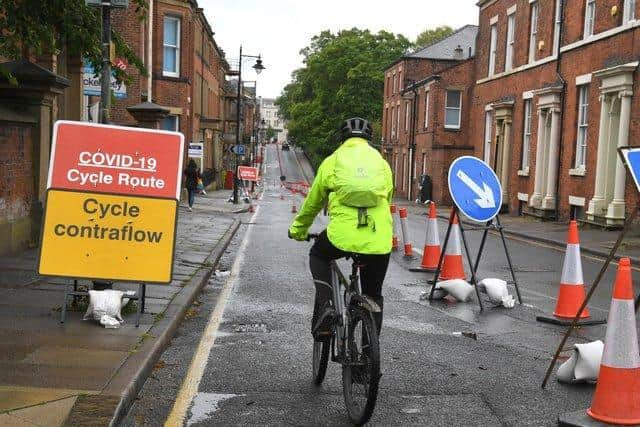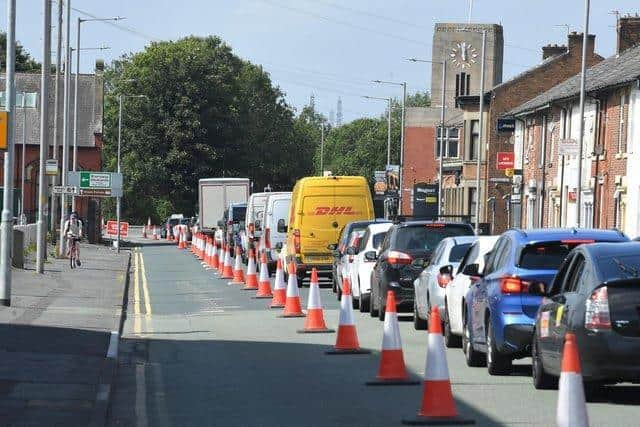Angry Preston motorists called highways boss at home over pop-up cycle lanes
and live on Freeview channel 276
The temporary facilities were installed on various routes in the city last summer as the country emerged from the first national lockdown.
The segregated lanes were designed to encourage people to get on their bike and so avoid overcrowding on public transport. Some of the changes were also intended to make space for pedestrians to help maintain social distancing.


Advertisement
Hide AdAdvertisement
Hide AdLocal authorities were given government cash to redesign road layouts in order to make novice or infrequent cyclists more willing to take to two wheels for journeys in and around their area.
However, many motorists in Preston were incensed when they became trapped in tailbacks alongside some of the new cycle routes - and claimed that the bikers that they were intended to benefit were not even making use of them.
The narrowing to one lane of a stretch of the A583 dual carriageway along Riversway and Watery Lane proved a particular flashpoint, with drivers branding the move “pointless” and “absolutely ridiculous” in online posts.
Lancashire County Council’s cabinet member for highways Keith Iddon says some felt so strongly that they even called him at home from their stationary vehicles to drive home their fury about the cycling routes.


Advertisement
Hide AdAdvertisement
Hide Ad“The temporary ones...didn't go down very well. I was a bit distraught one afternoon when I got about seven or eight phonecalls from angry motorists saying:
“‘Are you the lunatic that has put in these cycling and walking lanes? Because I’m trying to get home and it has taken me two hours. You’ll have had your tea and you’ll be sat watching the television and we’re still here - and there’s not a cyclist or a walker in sight’.
County Cllr Iddon, who made the revelation during a Lancashire Post debate ahead of this week’s local elections, accepted that some of the pop-up lanes were “in the wrong place”, but added that he was surprised by how little interest they had generated in Preston in comparison to Lancaster, where a similar scheme was better received.
However, the Conservative politician says he has not been diverted from the merits of encouraging more people to cycle.
Advertisement
Hide AdAdvertisement
Hide Ad“I was disappointed [with] how these lanes were used [in Preston] - they just weren't used as I would have expected.
“That’s what you’re up against as a politician, but my job is to convert people [and] to say: ‘This is what we’re doing, it’s better for you - can you not try to use them [and] leave your car at home, can you not try to walk or cycle?’”
County Hall was handed £782,000 last summer from the first tranche of the government’s active travel fund – 11 percent more than its basic allocation – following an assessment of its plans to encourage cycling and walking during the pandemic. The charity Cycling UK hailed what it described as the authority’s “highly ambitious” attempt to persuade more people of the benefits of pedal power via temporary schemes across the county.
The county council received a further £2.8m late last year for longer-term active travel projects.
Advertisement
Hide AdAdvertisement
Hide AdHowever, the initial cycling revolution on Preston’s roads was short-lived, with the controversial Riversway cycle lane removed by mid-September after the county council admitted that too few riders were using it to justify keeping the lane closure in place.
A cycle lane around the western side of Winckley Square bit the dust in August, having been dismissed by locals as akin to creating “a giant cul-de-sac”. Highways bosses said that reductions in traffic flow as a result of related restrictions preventing vehicles turning off Fishergate had already achieved the aim of making cycling and walking in the area safer.
Some of the longest-lasting changes were the closures to motorised traffic of some side roads off London Road, New Hall Lane and Ribbleton Lane to discourage rat-running - but these, too, were, reversed by October after the county council said they had become less popular as cycling routes with the onset of the cold weather.
The county leaders of Lancashire’s other main political parties weighed in with their visions for encouraging greener modes of transport as part of Lancashire’s post-pandemic future during the debate.
Advertisement
Hide AdAdvertisement
Hide AdLabour’s Azhar Ali called for the creation of a cross-party group to develop a climate change strategy that considered the entire county.
“The whole focus over the last four years has been about developing our city centres and...infrastructure. But the smaller towns in the east of the county [and] the Ormskirks, the Fleetwoods and the Morecambes have been forgotten.
“We need to... focus on Lancashire as a whole - and it will be a different solution [in] different parts of Lancashire, “ said County Cllr Ali, who also called for more electric charging points.
However, the Green Party's Gina Dowding warned that it would not be possible to “drive our way out of this crisis”.
Advertisement
Hide AdAdvertisement
Hide Ad“I know loads of people who’d really like to allow their children to walk to school, but at the moment, it just doesn't feel as though walking - and cycling - is safe enough. Those small journeys could be easily done by walking and cycling...and if we invest in the infrastructure, we have less congestion on the roads, healthier people and cleaner air - and all the other benefits of that.”
Meanwhile, Liberal Democrat group leader David Whipp said that if full-fibre broadband were rolled out to all corners of the county, it could encourage the home working that has been seen during the pandemic to continue.
“I’m hoping that we will use the opportunities that have been created to renew our town and city centres, perhaps with homes rather than businesses,” he said.
‘LANES WEREN'T LEFT IN PLACE LONG ENOUGH’
A keen cyclist from Ribbleton says that prospective users of Preston’s pop-up cycle lanes were not given time to appreciate the benefits they could bring before they were removed.
Advertisement
Hide AdAdvertisement
Hide AdLuke Bosman, a former chair of the Garstang Cycling Club, believes that the beefed-up temporary routes - which, unlike many of their permanent counterparts, boasted barriers separating riders from other road-users - would eventually have proved popular.
“One of the key things with any pop-up cycle lane is that you need to leave it in place long enough for people to actually change their behaviour.
“[People] are scared of the traffic, but if you give them segregated cycle lanes and the time to learn that they connect one place to another, they do get used.
“The [closure of] Fishwick Parade was really good, because previously it had been a rat-run and it also bypassed New Hall Lane very nicely - it became a pleasure to use. Similarly, the lane around Winckley Square made that little run getting into town that bit more pleasant for cyclists,” said Luke, who stood for the Liberal Democrats in the Ribbleton ward at this week's Preston City Council elections.
Advertisement
Hide AdAdvertisement
Hide AdHowever, he added that the route on Riversway was a “very strange” location for a cycle lane as it lay so close to the Guild Wheel which most cyclists would use if they were travelling in that area. He also said that the bike-only routes created by the closure of some of the city’s side roads were poorly signed.
“It was only because I saw an article in the Lancashire Post that I realised these weren’t just road closures, they were actually cycle routes."
Gordon Strefford, a member of Ribble Valley Cycling and Racing Club, says he was not surprised that the temporary lanes were better used in Lancaster than Preston, because of the way in which permanent cycling facilities have developed in the two cities.
“Lancaster is much more organised and although Preston has made an effort, [the routes] don't seem to join up too well - they are based in ad hoc places.
Advertisement
Hide AdAdvertisement
Hide Ad“Sometimes they might be just a few metres long and then they disappear altogether - but that’s all due to the complex infrastructure that Preston has,” Gordon said.
‘DRIVERS HAVEN’T GOT HORNS COMING OUT OF THEIR HEADS’
In spite of the caricature of cyclists and motorists at constant war, Hugh Bladon, from the Alliance of British Drivers, says that the organisation - and most car-users - have got “nothing against cycling”.
“The more cyclists the better, as far we’re concerned. However, to take a great chunk of Tarmac away from motorists - and create congestion and inconvenience for the sake of the odd cyclist who might wish to ride down a certain section of road when the weather is nice - is sheer and utter madness.
“We cannot understand why councillors have got this anti-motoring feeling. They just seem to think if you drive a car, lorry or van, then you have virtually got horns growing out of your head.
Advertisement
Hide AdAdvertisement
Hide Ad“Everybody has to go about their way of wife. You cannot and should not social engineer the way people live and behave - it is completely absurd.
“In my view, the councillors responsible for putting these cycling lanes in should be made to pay for their removal - that would teach them a lesson not to be so damn stupid,” Hugh added.
Comment Guidelines
National World encourages reader discussion on our stories. User feedback, insights and back-and-forth exchanges add a rich layer of context to reporting. Please review our Community Guidelines before commenting.
